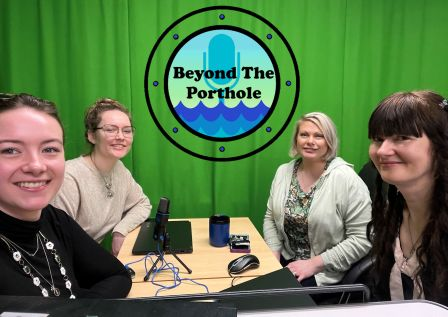Beyond the Porthole’s first full length episode ‘When The Ship Has Sailed’ is now live!
On this episode of Beyond the Porthole, join Daisy Turnbull, Charlotte Steffen and Suzanne Marie Taylor as they dive into aspects of maritime cultural history in this episode ‘When the Ship has Sailed’. Here they look at the histories of those who are left behind when seafarers leave town and the structure and social history of coastal and naval societies. Thinking about the less transient structures of coastal society and those that are ‘left behind’ when others take to the sea.
Link : soundcloud.com/user-133437113/episode-1-when-the-ship-has-sailed
Listen to their first guest, PTUC’s very own, Dr Melanie Bassett as she explains Dockyard Dynasties and her interest in studying urban coastal communities. Marvel at the work of Agnes ‘Aggie’ Weston and her foundation (that exists and provides help to this day) in an interview with the charity’s CEO, Mr Chris New, talking about the heritage and history of the chairy and the role it plays in supporting naval families. And wonder at elements of material culture, diving into some of the artefacts within museum collections that tell us about the role of ‘shore wives’.
_ _ _
We were delighted to invite into the studio Dr Mel Bassett to talk about her research and the research of the Port Towns and Urban Cultures project; it made for a really interesting discussion!
Dr Melanie Bassett is Research Fellow in Public Engagement (SASHPL) at the University of Portsmouth. She manages the PTUC website and social media outputs alongside undertaking her own research on port towns. Her PhD research, ‘The Royal Dockyard Worker in Edwardian England: Culture, Leisure and Empire’ re-examined the concept of a monolithic imperial identity and tracked the nuances of working-class imperialism. Her current research expands on her original thesis to explore the affect of empire on those workers who went to work in the Royal Dockyards abroad such as Bermuda, Malta, Gibraltar and Hong Kong.
Follow Melanie @melanie_bassett
See Melanie’s posts on this website
_ _ _
Aggie Weston’s Charity- An interview with Chris New, OBE-CEO
By Suzanne Marie Taylor
Arriving on a beautiful sunny morning to Castaway House, Portsmouth- headquarters of Aggie Weston’s Charity, I had a lovely time meeting and interviewing Chris New, OBE and CEO of Aggie Weston’s. Chris New spent 35 years in the Royal Navy as an Engineer Officer, and in recent years has led the Naval Service Diversity and Inclusion policy team. In this interview for Episode 2- “When the ship has sailed”, Chris New talks about the fascinating history of the charity and of its foundress – Dame Agnes Weston (1840-1918) – “The Sailor’s Friend”, who was known to all as “Aggie”. From its humble beginnings on the 8th May 1876 to present day, Aggie Weston’s serves and supports members of the Royal Navy, Royal Marines, Royal Fleet Auxiliary, and their families by providing pastoral support and practical projects. One of the charity’s current special projects is “Storybook Waves”- a project in which members of the Royal Navy, Royal Marines, and the Royal Fleet Auxiliary who are serving away from home, can record a bedtime story for their children to listen to, and maintain that close connection.
For more information about the Aggie Weston charity please visit their website www.aggies.org.uk , follow them on Facebook or on Twitter @Aggie_Westons.
_ _ _
Taking a look at some of the museum collections available online Daisy takes a look at the narrative and history of ‘shore wives’ and the role that women have traditionally played in supporting naval and other seafaring institutions. Within this thinking about the material forms of propaganda that have come to represent those that are ‘left behind when the ship has sailed’ and she goes some way in unpacking the historical perspectives that enter into this discussion.
To find out more about works and artefacts referenced please follow the following links:
- Smallwood, Amy Lynn. “Shore Wives: The Lives Of British Naval Officers’ Wives And Widows, 1750-1815.” (2008). (Accessed at: https://corescholar.libraries.wright.edu/etd_all/851/)
- Cordingly, David. Women Sailors and Sailors’ Women. Random House, 2001. (Accessed at:
- Royal Museums Greenwich Online archive:
Sadly Daisy was unable to visit these collections herself due to illness but her aim was to encourage thinking about museum collections, especially in maritime contexts. For you to consider which members of society are represented within displays of artefacts and how those people are represented. Ultimately, that many of the maritime collections in museums are positioned from a male-dominant and empirical perspective and that opportunity for feminist perspectives within this course of history warrant further study.
_ _ _
Thank you so much for joining us for this week’s episode!
We hope you have enjoyed it, please feel free to message us or leave a comment in response to what we have talked about or other aspects that may be of interest to our discussed theme!
Join us for our next episode ‘Crimes and Portside’ where we will be discussing wrecking and smuggling, the impact of prison hulks on Charles Dickens and how he writes about them in his book Great Expectations, and for a wonderful interview with Oscar Kaarlson talking about portside prisons including a hilarious tale involving kings cooks and cross-dressers!
Follow the Beyond the Porthole Podcast on Soundcloud, Spotify and Podbean for fortnightly releases! Or follow this link: https://rss.com/podcasts/beyondtheporthole/








